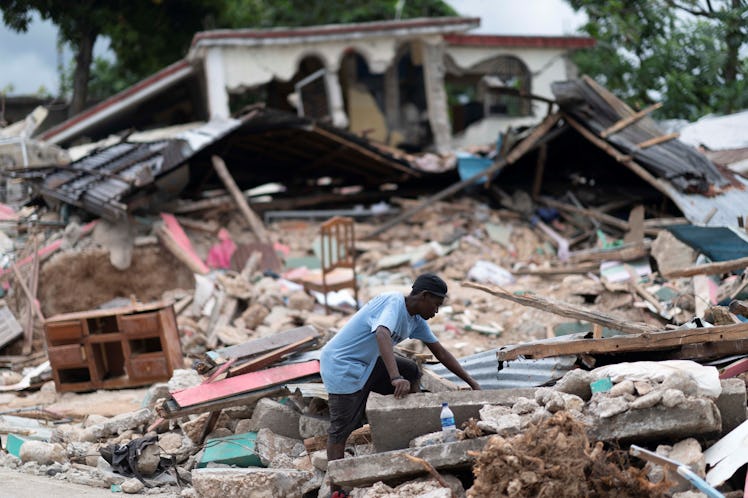
Here’s What You Can Do To Help Haiti After The Devastating Earthquake
People need medical care, shelter, and supplies.
On Aug. 14, 2021, Haiti’s population was devastated by a 7.2 earthquake which tore through the country’s south. Hundreds of thousands of Haitian residents have been affected by the natural disaster, and continue to struggle with losing homes, basic necessities, and loved ones. Experts expect the death toll to rise in the coming days and weeks, especially after Hurricane Grace hit the island, impeding search and rescue efforts. This tragic natural disaster struck as Haiti was still recovering from its 2010 earthquake, which impacted roughly three million people. While you may feel hopeless at the situation, there are some very important actions you can take to help the country rehabilitate. So, here’s how you can help Haiti recover after its devastating earthquake.
According to the United Nations Children’s Fund (UNICEF) Haiti’s Aug. 14 earthquake has affected over 1.2 million people, including over half a million children. As of Aug. 18, nearly 2,000 people are estimated dead, and 10,000 injured. Because the earthquake has torn through much-needed medical infrastructure, many people suffering from injuries don’t have access to the medical care they need — and in the wake of Grace, it’s even more difficult for relief organizations to deliver life-saving supplies. Right now, the lives of many Haitian residents depend on access to food and clean water, adequate health care, and health care professionals.
That’s why donating to locally operating relief organizations is more important now than ever: These organizations have better avenues to deliver necessary supplies to those in need, and they know which communities need the most help. Here are five organizations you can support to help Haiti’s locally based earthquake relief efforts.
GlobalGiving’s Earthquake Relief Fund
Founded in 2000, GlobalGiving is a charitable organization dedicated to connecting “people who have community and world-changing ideas with people who can support them.” Since the 7.2-magnitude earthquake struck Haiti, the organization has been accepting donations that will be directed toward “vetted nonprofits providing emergency relief, water, food, medicine, and shelter in Haiti.”
For GlobalGiving, it’s important that funds will be directed toward locally-led organizations, so you can be sure you’re donations are going where they’re most needed. If you aren’t sure where to donate, this is a great place to start. To support their work, you can donate here.
Partners In Health
Founded in 1987, Partners in Health (PIH) is the largest non-governmental health care provider in Haiti. For decades, PIH has been supporting the growth of the country’s health care infrastructure through programs addressing maternal and child health, malnutrition, mental health, and more. They’ve even developed a medical residency program “that trains the next generation of Haitian physicians.”
Now, PIH is working to mitigate the fallout of the Aug. 14 earthquake by providing hospital beds for injured residents, as well as mobilizing outreach teams to provide lifesaving care. To support their work, you can donate here.
World Central Kitchen
Many families have lost everything in the recent earthquake, including their access to adequate food and water sources. World Central Kitchen (WCK) is an organization dedicated to providing proper nutrition to those in need when disaster strikes. According to their site, “WCK has provided tens of millions of fresh, nourishing meals for communities around the world,” and has improved food security for the people they serve.
As thousands of people in Haiti are still struggling with major losses, WCK is mobilizing their team to distribute hot meals and supplies to those in need. To help their efforts, you can donate here.
Hope For Haiti
Hope For Haiti has been committed to supporting the country for over 30 years by investing in local education, health care, clean water sources, and more. According to their Aug. 16 earthquake response strategy, the organization is ready to take action. “We have a stockpile of emergency kits pre-positioned and ready to distribute to vulnerable individuals and families,” the strategy outlined.
The organization is preparing to distribute over $60 million in medical supplies and first aid equipment to residents who have been most harshly affected by the earthquake, per USA Today. “Given our over three decades of experience in emergency preparedness and response in southern Haiti, we are well-positioned and uniquely qualified to use our best available resources to help make a difference,” the strategy explained. You can donate to support their work here.
SOIL
Founded in 2006, Sustainable Organic Integrated Livelihoods (SOIL) has been working with some of the most underserved communities in Haiti to “facilitate the community-identified priority of ecological sanitation, where human wastes are converted into valuable compost.”
However, in the wake of the Aug. 14 earthquake, SOIL has teamed up with two community-based organizations to deliver emergency supplies to heavily affected areas. SOIL has been accepting donations that will be directed toward trusted local organizations to distribute as needed. You can donate to SOIL’s relief efforts here.
Doctors Without Borders
Since 1971, Doctors Without Borders (MSF) has been providing life-saving emergency medical care to communities in need all around the world. According to MSF’s Aug. 15 earthquake response strategy, “homes and infrastructure, including medical facilities, have been extensively destroyed and damaged in [southern Haiti]. Some hospitals had to evacuate their patients, and some lack medical equipment and medicines.”
Because the earthquake destroyed Haiti’s medical infrastructure in the most heavily affected places, MSF is organizing their teams to provide on-the-ground medical care. As they assess need in different areas, they’re “preparing to send in additional medical equipment, essential items, and medical teams to help care for the injured.” To support their work, you can donate here.